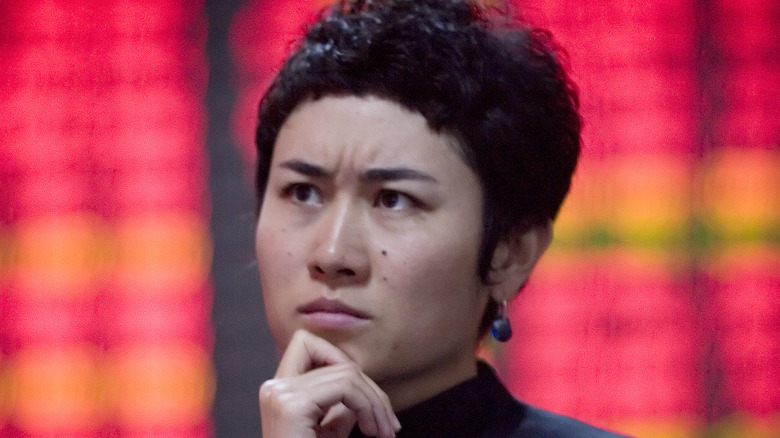Why The Lie Flat Movement Is Causing A Stir In China
If there is one thing that the enforced quarantines of 2020 taught us, it's that the world isn't going to come to an end if we quit running as fast as we can to keep up with the Joneses, the Smiths, the Garcias, and the Devis. With many young Chinese, though, it wasn't the pandemic along that promoted them to drop out of the rat race, despite the fact that 2020 just so happened to be the Year of the Rat (via Travel China Guide).
A movement that is growing in popularity in China is something called tang ping, which the South China Morning Post says translates to mean "lie flat." No, this is not some kind of yoga pose, but rather a philosophy that says there's no need to keep on working as hard as you can when there's so little reward to be gained from doing so. Instead, those who embrace the lie flat philosophy opt for doing the minimum amount of work needed in order just to scrape by.
What might inspire China's youth to drop out and lie flat?
In China, there is a great deal of pressure on young people that starts when they are students being exhorted to study, study, study for long hours every day. In fact, China was a very early adopter of high stakes testing. Nearly 1500 years ago, they instituted rigorous civil service exams that were extremely difficult to pass, but doing so was the only way to advance in society (via Columbia University).
A millennium and a half later, the pressure hasn't let up a bit. Once today's Chinese students are finally awarded their degrees, they barely get time to breathe before being expected to embrace not a 9 to 5 job, but a 9 to 6 one. What's even worse is the fact that many Chinese workers typically work for 6 days a week, so that makes for a 54-hour work week as opposed to our typical 40-hour one here in the U.S. So what do they get for all their effort? Exhausted, that's what. In some cases, they are worked quite literally to death, with the South China Morning Post reporting that some stressed-out tech workers have been dying of heart attacks in their 20s and 30s. As one would-be flat lier, a 25-year-old grad student, told the Diplomat, "Chasing fame and fortune does not attract me. I am so tired."
The father of today's lie-flat movement
While the concept of embracing a more minimalist lifestyle in exchange for more leisure time isn't any new thing, even in China, lying flat really started to go viral this past April when a man by the name of Luo Huazhong released his manifesto on a Chinese social media platform known as Baidu Tieba. In a post entitled "Lying flat is justice," he explained that "Lying flat is a state of mind — that is, I feel that many things are not worthy of my attention and energy."
Luo revealed that he has no steady job, and lives with his parents so he has few bills to pay. Occasionally, however, he does take a short-term gig, one that perfectly embodies his life's philosophy as he is, in fact, lying down on the job. So what does he work as, a mattress tester? No, it's even better than that. As the South China Morning Post reports, he works for the largest film studio on the world, which is located in Dongyang, Zhejiang. His position there? A prone one — he plays the role of a dead body whenever one is needed for a movie.
The Chinese government wants its young people to get back on their feet again
The government isn't taking the "lie flat" movement lying down. Instead, they're doing all they can to end this passive rebellion and get everyone back on their feet and contributing to society. China's President Xi Jinping addressed the issue in October in remarks published in the Communist Party political journal Qiushi. The president said the government needs to create more opportunities for upward mobility in order to, as South China Morning Post translates, "form an environment for improvement in which everyone participates, avoiding involution and lying flat." He did say that they should avoid the "trap of welfarism" so the wealthy didn't have to support the "lazy" poor, a somewhat surprising sentiment coming from a communist leader.
In addition to using its words, the Chinese government is resorting to censorship to discourage the spread of the lie flat movement and deploying the "Great Firewall of China" to redirect people's conversations back to the party line. They not only removed Luo Huazhong's original post about his lie-flat lifestyle from Baidu Tieba, but also went back and scrubbed all the discussions, reaction videos, etc. responding to the post.
While the government can influence people's words, or at least determine which ones get to reach a wider audience, the "lie flat" movement may not be so easy to quash. After all, how do you put down a protest movement where millions of people simply stay home and do nothing?



